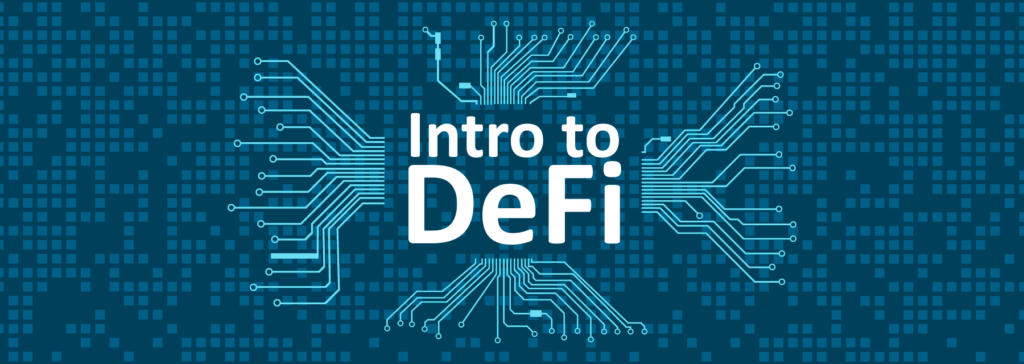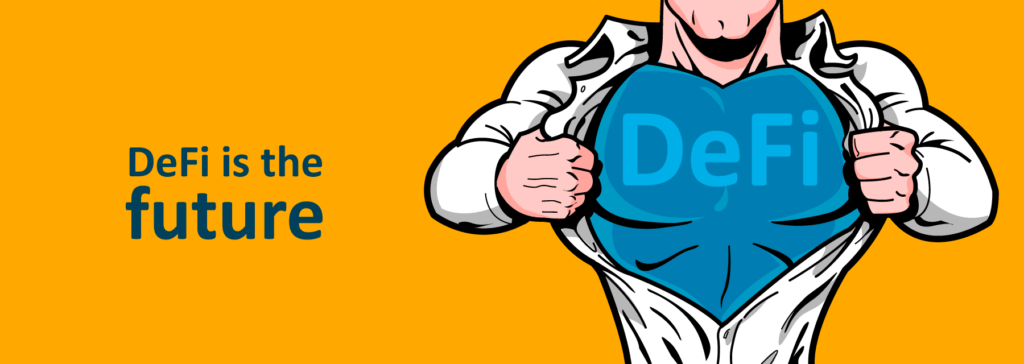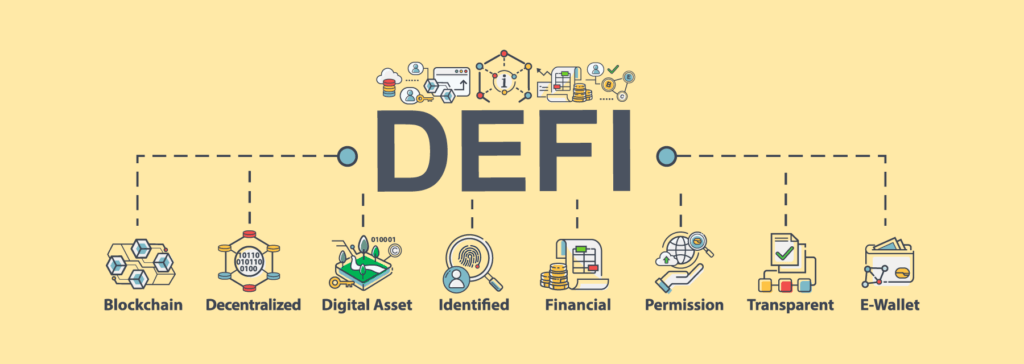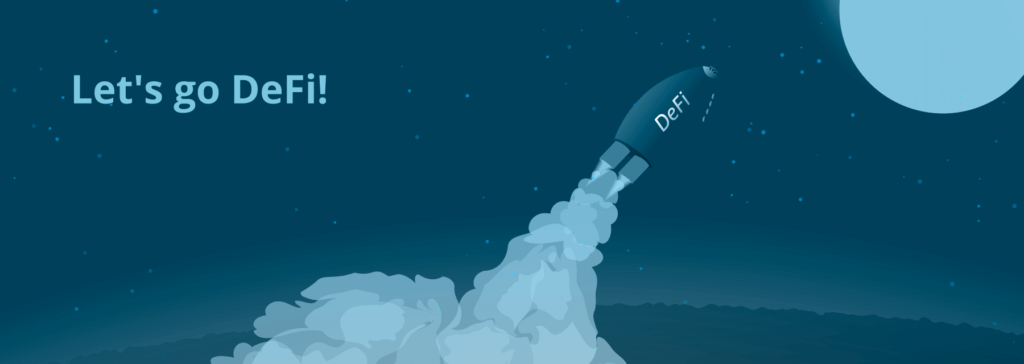The complete guide to DeFi
Before you dive headfirst into the wonderful world of decentralized finance (DeFi), you’ll likely have some questions.
Even if you’ve already dabbled with DeFi, it never hurts to brush up on the basics and keep up to date with the latest.
The DeFi world is evolving and changing all the time, so make sure you’re up to speed.
CryptoMeister is here to hold your hand and guide you through the mysterious and exciting world of DeFi.
From banking to P2P trading, DeFi has everything you have ever dreamed of and more!
Buckle up and stow your tray table, we’re taking off and heading for the world of DeFi!
What is DeFi?

Decentralized finance (DeFi) is everything the current financial system will never be.
It’s truly decentralized and corruption free.
It’s a world governed by code and automated contracts.
Some would even go so far as to call it financial heaven.
For DeFi removes all the pain points, suffering, scrutiny, and denials that the traditional finance world slaps you with.
Quite simply put, DeFi is finance for the person on the street.
Nobody in the DeFi world will judge you based on your spending habits or deny you access to financial products for nonsensical reasons.
You’re free to be you and manage your money however you want.
DeFi is a world built with smart contracts on top of the Ethereum and Binance Smart Chain networks.
It allows you to cut out the middleman, saving on fees and giving you the power to put your money to work.
Whether you want to make your money work hard for you and lend it out, or you want to take out a loan to purchase your next car – DeFi can make it happen.
As the name suggests, DeFi is quite literally decentralized finance.
It’s the finance world that you know and despise without all the middlemen.
Why is DeFi important?

The world has gone through countless revolutions, and the next revolution is already well under way.
The name of this revolution?
Decentralized finance (DeFi)!
DeFi is so important for this world because of the benefits that it offers.
It takes the concept and premise of Bitcoin and expands on it, taking Bitcoin and cryptocurrency to the next level.
Bitcoin kicked everything off, and DeFi brings it together with everything else you need to run the financial industry of a society.
DeFi creates a digital alternative to Wall Street that’s free from all the middlemen, fees, corruption, and more.
It brings a fair, open, and trustworthy financial system to absolutely anyone in the world.
You hear of crypto projects claiming to bank the unbanked, but it’s DeFi that will make this grand promise a reality.
Not only does DeFi bring banking to the unbanked, but it also brings the entire financial ecosystem along with it.
This in turn will provide people around the globe with equal and fair financial opportunities at the fraction of the cost it normally would.
Best of all?
You don’t have to give up your privacy and data if you choose not to.
DeFi gives people the freedom to take full control of their finances.
And that’s why DeFi is so important!
What are the perks of DeFi?

Decentralized finance (DeFi) might still be relatively young, but it boasts an impressive range of perks and advantages.
For the time being, a lot of the perks are pipe dreams, but some are here and ready to use right now.
At the moment, you can currently do the following things with DeFi:
- Lending
- Taking out loans
- Trading
- Saving
- Trading derivatives
As time goes on, this list of perks will only grow until DeFi is at the same level as the current financial services world.
If you want to lend out your crypto, you’re free to do so.
You can lend out as much or little as you wish, generating rewards and interest with every passing second.
This is better than with your bank as your bank will only get interest monthly, if you’re lucky.
Taking out loans is simple with DeFi.
As long as you’ve got the capital required to cover the liability, you’ll automatically be approved.
You can take out long-term loans as well as “flash loans”, a product that banks don’t offer.
This gives you unmatched opportunities when it comes to looking at new ways to finance purchases and trades.
When it comes to trading, you can use a wide range of decentralized exchanges.
These are much safer than centralized exchanges as no funds are stored on the exchange.
You simply link your wallet to your trading account, input how much you wish to sell, what you wish you buy and a smart contract handles everything else.
There are also no withdrawal fees involved as the crypto comes from and goes straight to your crypto wallet – no middlemen.
Saving for the future is even more rewarding thanks to DeFi.
Whether you want to save fort a rainy day, plan for your retirement or put aside for your kid’s school fees, you can do it in DeFi.
Crypto savings accounts can be set up using stablecoins, and smart contracts will loan it out.
It’s very low risk and yields greater interest rates than your bank will offer you.
If you fancy a bit more risk and a lot more return, you can start yield farming and putting your money to work.
Finally, you can make long or short bets on a wide range of derivatives, just like you can on the stock market.
These give you quick and easy crypto exposure without the stress of going through the centralized crypto exchanges.
How does DeFi work?

Decentralized finance (DeFi) gives you access to financial services that have no central authority.
But a new financial system needs core components to work properly.
You need all of the following components for a successful new financial system:
- Infrastructure
- Currency
- Financial services
So, let’s break each of these down and go into more detail about what they are and how they work.
Infrastructure
For the DeFi space to work, we need infrastructure to run everything.
This infrastructure needs to be code-driven and running on a blockchain to ensure that humans can’t interfere and fill it with corruption.
In steps Ethereum.
Ethereum was the first blockchain that allowed developers to write decentralized applications (dApps) and smart contracts.
In fact, Vitalik Buterin outlined the potential for DeFi in the Ethereum white paper back in 2013.
These smart contracts manage all the financial applications that you wish to conduct in a decentralized manner.
Think of the contracts as the middlemen.
You create the rules of the new financial system, or a piece of it.
Throw in how you wish the exchange to take place and push it to the blockchain.
Once live, you’ve got an immutable contract that handles a specific transaction or task between 2 or more parties.
Whether it handles P2P trading on a decentralized exchange (Dex) or allows you to lend out your crypto and earn interest, these smart contracts do all the grunt work.
These smart contracts and dApps all merge together to create the building blocks of the DeFi space.
They’re also known as money Legos, for the reason that you can pick different dApps and contracts, stick them together and enjoy the DeFi space.
Currency
Now we’ve got the infrastructure sorted, it’s time to pick a currency to use in the new financial world.
You might be thinking, why not just use Bitcoin or Ether, the native currency of Ethereum.
While Bitcoin did kick off the new financial revolution, it’s not really designed or suited to high frequency payments, transactions and more.
Ether is a good contender, but it’s still too volatile.
Volatility makes saving and taking out loans safely impossible.
So, we need a new currency to power for the DeFi world – stablecoins.
But, early stablecoins, such as Tether, come with a whole pile of abuse and manipulation claims.
These rely upon a centralized entity keeping enough fiat currency in a bank account.
This doesn’t quite work or gel with a new decentralized financial system.
So, DAI from MakerDAO is the stablecoin of choice, and it’s virtually perfect.
Instead of requiring a centralized entity to be trusted to store enough fiat in a bank account, DAI uses smart contracts to keep it all fair and square.
To get your hands on DAI, you must deposit some Eth into your account at a ratio of 150%.
This ensures that DAI is overcollateralized, meaning that it’s better at keeping a stable price than other stablecoins.
If Eth suddenly drops in value and your collateral goes to 100%, smart contracts will take over and convert your DAI back to Eth.
This prevents DAI from becoming unstable and unbacked, a feature that makes it the best choice for DeFi.
You can then use DAI safely in the DeFi space.
Financial services
The final loop of the new financial world is services.
Without services, users have nothing to play with and no reason to enjoy the DeFi world.
These services include:
- DEXs
- Yield farms
- Borrowing facilities
- Lending pools
A decentralized exchange (DEX) allows users to sign up, buy, sell and trade cryptos without completing any form of KYC.
This means you can remain pseudonymous while trading crypto.
Another major advantage of a DEX over a centralized exchange (CEX) is that no funds are kept on the exchange.
What you do is link your wallet to your account and you place trades directly from your wallet.
Smart contracts then take over and process the exchange of funds, depositing the new crypto in your wallet of choice.
As a result, there are no withdrawal fees.
This type of operation keeps your funds safe and secure, which is more than can be said for a CEX.
Yield farms allow you to offer up your cryptocurrency in pools and earn interest for doing so.
It’s very similar to lending pools in the sense that you lock away your crypto for a chance to earn passive income.
The lower the pool liquidity, the higher the fees are to borrow from the pool.
Fees charged to borrow are diverted back to the liquidity providers, meaning that they make more money in these situations.
These decentralized services allow you to cut out the middleman and assume the role of a bank or customer.
It makes using financial services cheaper and more streamlined, which is what people want.
You can even get insurance through DeFi.
Just like the other services, there are people that want insurance and people that are happy to risk their capital to earn.
It works just like other DeFi services in that you’re matched with pools of funds, only that the fees you pay go to the people providing funds to the pools rather than a company.
Again, you can opt to join the insurers or the customers – why not do both!
Pros of DeFi

Obviously, decentralized finance (DeFi) has a lot of potential to reshape the world.
If used in the right way, DeFi could become the new norm, which would be huge.
The advantages of DeFi over the traditional finance world are:
- Instant access
- No need to open accounts
- Financial freedom
- Interest rates and rewards are higher and faster
- Open and transparent governance
- Ability to become your own bank
DeFi gives you the power to connect your wallet and get going.
You can instantly provide liquidity or take out a loan, no need to open an account or fill out tons of tedious paperwork.
DeFi also gives you the power to manage and control your assets at any time of day, anywhere in the world for an incredibly low cost.
Transactions are virtually instant and cost a fraction of traditional finance services.
Best of all, DeFi gives you the power to become your own bank, taking loans and lending money with the safety of smart contracts.
Cons of DeFi

On the other hand, decentralized finance (DeFi) does have a few drawbacks.
But, with the right assistance from the traditional finance world, it can overcome these and thrive.
The downsides of DeFi are:
- Fluctuating price of Ethereum can make transactions expensive
- Can accidentally expose yourself to high-risk investments
- Need to record transactions manually to report taxes.
- Some smart contracts are not fully audited
- DeFi is still young
If you’re going to use DeFi on the Ethereum blockchain, then you need to watch out for the gas fees.
While the London upgrade has helped reduce the gas fees, they’re still not optimal.
Once the full release of Ethereum 2.0 is here, it will fix this issue indefinitely, meaning that DeFi will get a huge boost.
DeFi on the Binance Smart Chain is more financially viable for the time being.
Due to the fact that DeFi is still young, it means that some smart contracts go live without being fully audited.
This in turn means that there are potential bugs that could impact your balance at the end of the day.
The young age also means that it’s far too easy to get yourself involved in a high-risk investment without knowing about it.
But, as time goes on and DeFi learns from traditional finance, checks and balances will be put in place to help fix these issues.
Will DeFi take over the world?

Decentralized finance (DeFi) has a lot of potential and power, but it needs to learn how to harness it.
It is still in its infancy but is already lightyears ahead of where the traditional finance world was at its age.
This bodes well for DeFi and if it can pick up a few traits from the traditional finance world, such as checks to ensure people understand the volatility of an investment, then it will thrive and grow.
DeFi has all the hallmarks of a great financial ecosystem, and as time goes on, we’ll likely see DeFi slowly edge out traditional finance.
This might take a number of years, but DeFi definitely has a bright future ahead of it.
Who knows, maybe in the future we’ll be taking out home loans using DeFi, paying interest back to everyday citizens rather than the banks.
We could also see banks and other financial institutions getting involved.
They could add liquidity to pools or provide loans to people that don’t want to use DeFi.
There is so much potential for DeFi, if it can sort out its teething problems and grow up.
For now, though, DeFi is still very much a casino where people are gambling their savings in a bid to become rich overnight.
Until this ends, DeFi will not grow or replace the financial industry as we know it.
Frequently Asked Questions (FAQ)
DeFi stands for ‘decentralized finance’ and is the idea of operating a financial network in a decentralized manner with all transactions controlled by smart contracts on a blockchain.
DeFi allows users to trade, lend, borrow and earn interest on their holdings, with every transaction processed on the blockchain free from human intervention or influence.There are many examples of DeFi protocols around today. A popular one is a DeFi loan facility, where you deposit collateral in the form of cryptocurrency and get an immediate loan based on how much you deposited.
The same platforms allow you to be on the lending side, earning some of the interest paid by the borrower.